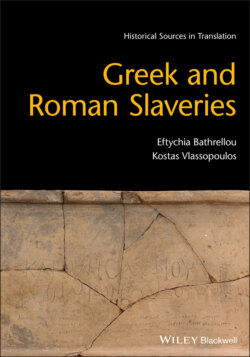Читать книгу Greek and Roman Slaveries - Eftychia Bathrellou - Страница 72
2.22 I.P hilippi 416: Latin Funerary Inscription, Philippi, Macedonia (First–Third Century CE)
ОглавлениеLiterature: Aubert 1993; Gardner 1993: 59–60; Martin 2003: 226–7.
Here lies Vitalis, slave of Gaius Lavus Faustus, also his son, a home-born slave (verna), born in the household. He lived 16 years. Manager (institor) of the Apriana tavern, well received by the people but snatched away by the gods. “I ask you, travelers, if I ever sold somewhat less than the correct measure, in order to add to my father’s gains, forgive (me). I ask the gods above and those below that you preserve my father and mother. And farewell!”
What is the relationship between the slave and his master?
What do we learn about the slave’s professional activities?
How does the slave describe himself?
In whose voice does the text speak? Does this imply that it was composed by the slave himself? Compare with 7.39.
How useful is this inscription for understanding slavery?
